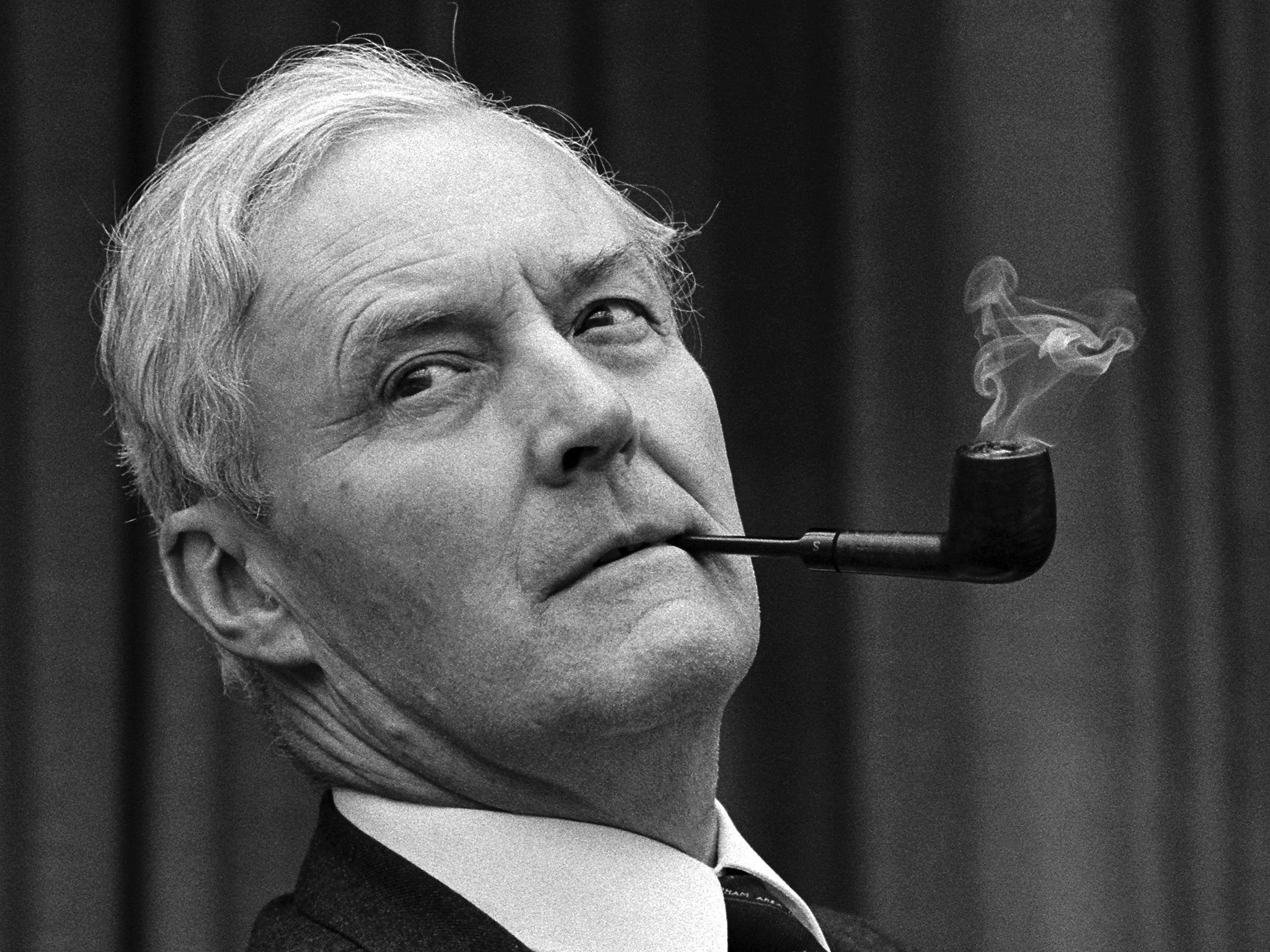Tony Benn dies: Warm in his friendships, harsh in his judgements - and blessed with an obstinacy that was magnificent
The Tony Benn I knew was an intriguing, complex and towering figure - and I shall miss him


It is a shock. Not an unexpected one, because though the mind was alive, the body had been declining for months.
I shall miss him because Tony Benn was a towering figure, one of the rare politicians who, in his day, was a household name - bigger than any post he held. It will not emerge from the tributes we will hear today, but it was also staggering how much he was reviled in his time, because he was not some gentle socialist guru, he was a political street fighter, warm in his friendships and harsh in his judgements.
On a personal note, there is an entry dated 27 June 1993 in Tony Benn’s copious diaries, which describes a family tea party, in which he was presented with a biography of the recently elected Labour leader, john Smith. It reads:
"Andy McSmith, who has just written the life of John Smith, was there and he kindly signed it ‘To Tony Benn, my friend and mentor.’ It was very nice of him. He is an absolute hack Kinnockite, but a great friend of Nita’s.”
This sentence is actually very revealing of its author. First, there is the word ‘but’ lodged between ‘Kinnockite’ and the observation that Benn’s daughter in law, Nita Clarke, and I were good friends. It as if it there were something strange about a ‘ Kinnockite’ being a friend of someone in the Benn family.
One of the attractive aspects of Tony Benn’s intriguing, complex character was that he never demanded of his own family that they should be what used to be called Bennites. His son Hilary has consistently defended the Iraq war that Dad so furiously opposed. The old man was thrilled when his 18-year-old granddaughter, Emily, was adopted as a Labour candidate, notwithstanding that she was arguably more Blairite than her Uncle Hilary. Nita Clarke’s political progress took her to Downing Street, as a special adviser to Tony Blair, for which she received a mention in his memoirs and an OBE. None of this weakened the family ties: there was no ‘but’ in Nita’s having a ‘Kinnockite’ friend: she was more ‘Kinnockite’ than I was.
But Tony did not let that lazy Sunday afternoon in June 1993 go by without an argument with someone. When no one else was listening, he gave me that ‘contradict me if you dare’ look and asserted that Tony Blair, then the rising star of the shadow cabinet, was worse – ie more right wing - than David Owen, leader of the rump Social Democratic Party. He was so obviously daring me to disagree that I did, and tried to put up a feeble argument that Tony Blair was really quite left wing. That is what earned me the epithet ‘hack.’ Even so, to attach the adjective ‘Kinnockite’ to someone who had just completed a sympathetic biography of John Smith leaves me wondering if he knew how tense relations between the leader and ex-leader were. Perhaps Benn’s mind was too focused on the great sweep of history to know or care about these simmering rivalries.
But the oddest mistake in this short entry is that he attributes the words ‘my friend and mentor’ to me. I did not write those words. John Smith did, in his own handwriting. Benn had been reviled for years in a manner compared with which the worst that was written about the late Bob Crow seem mild by comparison. He had been ostracised by Neil Kinnock, not just because Kinnock could not stand the sight of him, but because isolating Benn was seen as the first basic step towards making Labour electable. For John Smith to write a message showing him respect and friendship was a gesture of some political significance, but Benn was neither flattered nor interested: by the time he came to write up his diary, he could not even remember whose handwriting he was looking at.
The story shows an absence of vanity on his part. He was capable of rising above the petty self-regard that is all too common among career politicians, and yet sometimes he could be curiously defensive about his record in government. He wanted it to be remembered that he was a man with early experience of government. He liked to claim that he was a Cabinet minister before he was 40, which was not strictly true. From 1964 to 1966, he was Postmaster General, which was not a Cabinet post, though he attended Cabinet meetings. He was raised to the Cabinet as Minister of Technology, when he was 41.
The first time I met Benn was in September 1980, when he was in Newcastle upon Tyne, promoting his book, Arguments for Socialism, and to the despair of Penguin’s promotions department had insisted on doing a signing in a little left-wing bookshop called Days of Hope, rather than any capitalist run High Street bookshop. I helped ferry him round various television and newspaper offices, and in the privacy of a sympathiser’s car heard him assert that Mo Mowlam, the future Northern Ireland Secretary, was an agent of the CIA. He expressed a similar belief about Christopher Mayhew, a former Labour defence minister who defected to the Liberals. In his defence, I should say he was then still apparently within shooting distance of being Prime Minister, and he had reason to worry about whether the intelligence services would make mischief if he ever reached Downing Street. I have no idea whether his suspicions about Mayhew were well grounded, but I knew Mo Mowlam well, and I have no doubt that he was wrong about her.
In the early 1970s Benn decided that the parliamentary system could not solve society’s injustices unless it was reinforced by mass action, and that socialism, meaning the common ownership of the means of production, was what working people either aspired to, or would do when political consciousness had been forged in struggle. That was an optimistic idea, to put it mildly. Experience has not born it out. But he held to it with an obstinacy that was magnificent in its wrong headedness.
His beliefs brought years of sustained abuse. It began early in the 1970s, when the Daily Express thought nothing of publishing a cartoon of him dressed in Nazi uniform, and continued without let up for the best part of 15 years. He never relented, though when Neil Kinnock delivered his famous attack on Militant at the 1985 Labour conference, provoking jeers and walk outs from the ultra-left, Benn played no part in the protest because he had made a point of not being there. He told me he was “taking a rest from public disapproval.” Political defeat did not, however, cause him to think that he might have got it wrong. During our last long conversation, on the day Andy Murray won Wimbledon, he was physically very frail but the certainties that had formed in his mind 40 years previously had not weakened.
He was a towering figure, strong willed, intelligent, and stubborn, and with an extraordinary fund of experience. When Billy Bragg wanted to meet him, in July 1985, I brought them together in the Commons, and Benn was utterly charming to the young and then relatively unknown singer. He took us to a tea room in the Commons, and told us how he had once been there with his father, and Paul Robeson, whom Viscount Stansgate persuaded to sing "Ol’ Man River". Robeson began singing quietly, in that deep voice, and all conversation in the tea room stopped.
Benn rose to be a great deal more famous than his father. When he fought the Chesterfield by-election in 1984, a poll revealed that more than 90 per cent of that constituency’s electorate could name the Labour candidate, unprompted. Visiting a local hospital, with camera crews and the press packs in tow, he came to the bed of a very elderly lady, who exclaimed: “I remember thee: weren’t thou t’ fellow that didn’t want to be a lord?” Benn’s pleasure at this recollection of his struggle to renounce his peerage dimmed a little when she added: “What’s thou doing in Chesterfield?”
When this was reported back to Neil Kinnock’s office, it was thought to be a very good question.
Join our commenting forum
Join thought-provoking conversations, follow other Independent readers and see their replies
Comments